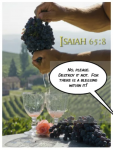This claim has absolutely no scriptural support; it is eisegesis and has no evidentiary power in this discussion.
1. Matthew 26:27-29 — Jesus’ Use of “Fruit of the Vine” and the Symbol of Purity
“And he took the cup, and gave thanks, and gave it to them, saying, Drink ye all of it; For this is my blood of the new testament, which is shed for many for the remission of sins. But I say unto you, I will not drink henceforth of this fruit of the vine, until that day when I drink it new with you in my Father's kingdom.”
- Commentary: Jesus refers to the wine as “fruit of the vine” and specifies drinking it “new” with His disciples in His Father’s kingdom. The emphasis on it being “new” suggests a pure, unfermented substance, free from decay or corruption. If we consider the blood of Christ as pure and holy, it is fitting that it be symbolized by something similarly pure and fresh. This choice of words contrasts with fermented wine, which involves a process of decay—a property seemingly inconsistent with the unblemished and holy nature of Christ’s blood. For someone questioning this interpretation, it’s worth noting that if Jesus wanted to symbolize purity, it makes sense He would use the pure, fresh fruit of the vine.
2. 1 Corinthians 5:7-8 — Symbolism of Leaven and the Call to Purity
“Purge out therefore the old leaven, that ye may be a new lump, as ye are unleavened. For even Christ our passover is sacrificed for us: Therefore let us keep the feast, not with old leaven, neither with the leaven of malice and wickedness; but with the unleavened bread of sincerity and truth.”
- Commentary: In this passage, Paul uses leaven as a symbol for sin and corruption, urging the church to be like “unleavened” bread—pure and free from corruption. This connects to the natural role of yeast, or leaven, which initiates a process of decay. The same yeast used in bread also naturally occurs on grape skins and begins the fermentation process, breaking down the sugars in grape juice and transforming it into alcohol. This process introduces decay, mirroring how leaven represents sin. Just as Paul instructs believers to “purge out the old leaven” to maintain spiritual purity, unfermented wine (free from the effects of yeast and decay) aligns with the symbolism of Christ’s blood as pure and undefiled. The choice of unfermented wine in the Lord’s Supper then becomes a fitting representation of sincerity and truth, as it is free from the fermenting effects that symbolize malice and wickedness.
3. Proverbs 20:1 — The Potential Harm of Fermented Wine
“Wine is a mocker, strong drink is raging: and whosoever is deceived thereby is not wise.”
- Commentary: Proverbs 20:1 provides a clear caution against the effects of fermented wine, linking it directly with deception and poor judgment. This verse highlights the dangers associated with fermented wine and underscores why unfermented wine is a more appropriate symbol for Christ’s blood. Fermented wine, which brings mockery and loss of wisdom, stands in stark contrast to the purity and clarity found in Christ’s sacrifice. Using unfermented wine in the Lord’s Supper preserves the symbolism of holiness and purity, avoiding associations with corruption and moral compromise.
4. Proverbs 23:31-32 — Warnings Against Fermented Wine and Its Consequences
“Look not thou upon the wine when it is red, when it giveth his color in the cup, when it moveth itself aright. At the last it biteth like a serpent, and stingeth like an adder.”
- Commentary: This passage cautions against wine that has undergone fermentation, emphasizing its potential to “bite like a serpent.” Fermentation is explicitly mentioned, as it causes the wine to “move itself aright” as it bubbles and changes. If we take wine as a symbol for Christ’s blood, using something associated with decay and harm is inconsistent with the purity of His sacrifice. For someone questioning this interpretation, it’s useful to point out that unfermented wine, free from these associations, aligns more naturally with the purity of Christ.
5. Isaiah 65:8 — The Blessing in Fresh Juice as “New Wine”
“Thus saith the LORD, As the new wine is found in the cluster, and one saith, Destroy it not; for a blessing is in it: so will I do for my servants’ sakes, that I may not destroy them all.”
- Commentary: The “new wine” in this verse is described as being “within the cluster” of the grape, clearly identifying it as the fresh juice contained within the fruit. This fresh juice is called a blessing, reinforcing the idea that unfermented juice holds purity and life. Grapes do not grow on the vine as alcoholic wine; they require time to ferment, a process that introduces decay and transformation. In other words, the blessing within the cluster is pure grape juice, not alcoholic wine.
To illustrate further, consider an analogy: if we said that “new orange smoothie” is found within an orange, it would sound nonsensical. Smoothies generally include additional ingredients such as ice, milk, or yogurt to give them a creamy texture and chill, requiring a separate process to create. Within an orange, there is simply fresh, natural juice—not an orange smoothie. Similarly, alcoholic wine is the result of fermentation, which changes the nature of the juice over time. Just as a smoothie is made by blending the orange juice with other ingredients, alcoholic wine is produced by fermenting the juice over time. Within the cluster of grapes, there is only fresh, unfermented juice—not alcoholic wine. The “new wine” here is directly identified with the purity of fresh grape juice, making it a fitting symbol of blessing, life, and purity rather than the decay associated with fermentation.
You said:
More eisegesis. There isn't any Scripture that says "fermented wine... symbolizes a process of decay".
Also see
post #101. I have a few more points with some other verses.
May God bless you.
....
